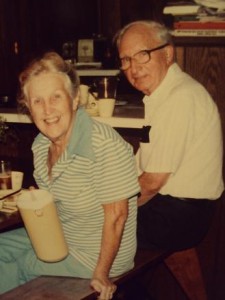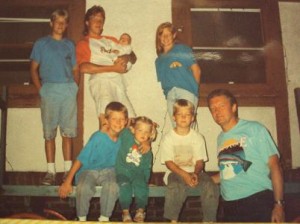For nearly 30 years, my dad owned a successful engineering firm, operating out of a Chicago high rise in the concrete canyons of the Loop. As a kid I visited him often (with girlfriends in tow), admiring the thick glass double doors in his reception area and his big office overlooking the skyline.
Dad’s drafting room resembled a Disney studio with its 200 tilted drawing tables and men perched atop tall stools working on royal-colored blueprints. To him, though, it was just a way to earn a living. After retirement at 70, he didn’t look back and never missed it.
Dad did well for a little boy who started school without a word of English. His Swedish immigrant parents worked hard and expected him to do the same, which he did, finishing school with two degrees from Northwestern University.
Attending a Swedish Free Church in the city, he heard the Gospel as a child and received Christ into his life, never wavering in his commitment. A quiet man, he didn’t dictate his faith but lived it out in front of us for 92 years. As Mom frequently said, “Your father is the most Christ-like man I’ve ever known.”
When Dad died, his last will and testament was more like a last will and testimony. I read the legal document through, no small task with its complicated legalese, but two paragraphs jumped off the pages. They had nothing to do with possessions, trusts or assets, and were written in simple language I understood:
Article I – I commit my soul into the hands of my Savior in full confidence that, having redeemed it and washed it in His most precious blood, He will present it faultless before my Heavenly Father.
Article IV – It is my hope that the beneficiaries will remember the words of Our Lord who said, “A man’s life consisteth not in the abundance of the things which he possesseth.” (Luke 12:15) Let them consider themselves as stewards of their possessions, not forgetting to use them for the welfare of others, particularly with respect to bringing the Gospel of Jesus Christ to those in spiritual darkness. By giving both time and money unselfishly, they will discover the truth of Our Lord’s words: “It is more blessed to give than to receive” (Acts 20:35) and “Whosoever will be chief among you, let him be the servant of all.” (Matthew 20:27)
Dad was ready to die, because he’d made the main thing the main thing. He’d led a life of quiet sacrifice, serving the poor, giving 50% of his income to the Lord’s work, and putting himself after everyone else. He’d given much and, as the Bible says will happen to a giving person, he was then given more.
He also left a legacy of harmony in his family, a large group in which there was no fighting, no anger, no bitterness. I remember hundreds of the words he spoke in life but none more vividly than those he left in death.
“Freely ye have received, freely give.” (Matthew 10:8)





